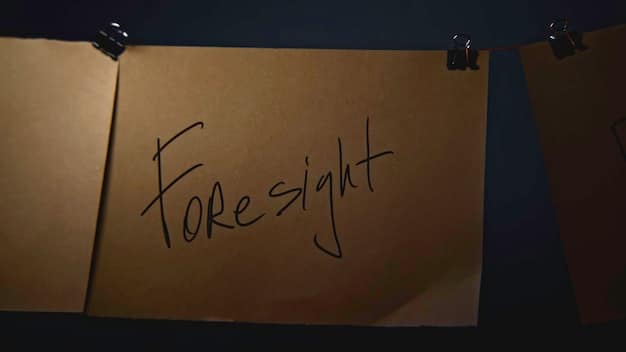Documentary Film Ethics: A Reviewer’s Guide to Non-Fiction Dilemmas

Documentary dilemmas involve navigating complex ethical considerations when reviewing non-fiction films, encompassing honesty, objectivity, and respect for subjects, ensuring responsible and insightful critique.
Reviewing documentaries presents a unique set of challenges, requiring critics to consider not only the film’s artistic merit but also the ethical implications of its content. Navigating these documentary dilemmas demands a keen awareness of the responsibilities that come with analyzing and interpreting non-fiction narratives.
Ethical Foundations of Documentary Reviewing
Documentary filmmaking inherently involves capturing and presenting reality, often raising complex ethical questions for both creators and reviewers. Understanding the foundational ethical principles is crucial for responsible and insightful critique. Let’s dive into the basic considerations.
Documentary reviewers must approach their work with a strong sense of responsibility. They need to balance their critical analysis with respect for the subjects and stories depicted.
Honesty and Objectivity
Maintaining honesty and objectivity is essential. Reviewers must present their opinions fairly and avoid bias based on personal beliefs or external pressures.
It’s important to acknowledge any potential conflicts of interest, such as personal relationships with the filmmakers or subjects.
Respect for Subjects
Documentaries often involve vulnerable individuals or communities. Reviewers should demonstrate sensitivity and avoid sensationalizing or exploiting their stories.
Consider the potential impact of the review on the subjects’ lives and well-being.

Ethical awareness ensures that the review respects the rights and dignity of all individuals involved.
- Verify information and sources to ensure accuracy.
- Avoid promoting misinformation or sensationalism.
- Assess the film’s impact on its subjects and audiences.
Ultimately, strong ethical foundations in documentary reviewing lead to better-informed and more responsible film criticism.
Navigating Consent and Representation
Documentaries frequently delve into sensitive subjects involving real people and their experiences. Respecting consent and ensuring fair representation are paramount ethical concerns for reviewers to consider. How can critics properly assess these crucial elements?
Understanding the nuances of consent and representation is vital for responsible documentary film criticism.
Informed Consent
Documentary subjects should provide informed consent, demonstrating they understand the film’s purpose and how their story will be used.
Reviewers should assess whether the film adequately addresses issues of power dynamics and potential exploitation.
Authenticity and Accuracy
Accurate and authentic representation is crucial for documentaries. Reviewers should critically examine whether the filmmaker’s portrayal aligns with the subjects’ experiences and perspectives.
Reviewers can look for multiple perspectives and narratives to assess the accuracy and balance of the representation.
Avoiding Harmful Stereotypes
Documentaries should avoid perpetuating harmful stereotypes or misrepresentations of marginalized groups. Reviewers need to be vigilant in identifying and addressing such issues.

Reviewing documentaries with an awareness of representation can help promote empathy, understanding, and social justice.
- Examine the film’s use of language, imagery, and storytelling techniques.
- Assess whether the subjects have agency and control over their narratives.
- Consider the broader social and cultural context of the film.
By carefully examining consent and representation, reviewers can contribute to a more ethical and responsible documentary filmmaking landscape.
The Role of the Reviewer’s Own Perspective
Reviewers inevitably bring their own background, biases, and experiences to their analysis. Understanding how these factors influence their interpretation is essential for maintaining fairness and objectivity. How should reviewers manage their personal perspectives?
The role of the reviewer’s personal perspective in documentary analysis is a critical consideration.
Acknowledging Biases
It’s important for reviewers to acknowledge their own biases and understand how they might influence their interpretation of the film.
Self-awareness can help reviewers approach documentaries with greater objectivity and fairness.
Transparency and Disclosure
Reviewers should be transparent about any potential conflicts of interest or personal connections to the film or its subjects.
Disclosure helps readers understand the reviewer’s perspective and evaluate their analysis accordingly.
Contextualizing Interpretations
Reviewers should contextualize their interpretations within the broader social, cultural, and political landscape.
Understanding the context can help reviewers avoid imposing their own values and beliefs on the film.
Being aware of personal perspectives enhances the credibility and value of documentary reviews.
- Reflect on your own values and assumptions.
- Be open to different perspectives and interpretations.
- Avoid imposing your own narrative on the film.
Ultimately, a reviewer’s perspective can enrich the analysis while maintaining ethical responsibilities.
Evaluating Filmmaker Intent vs. Impact
A documentary’s impact on its audience and subjects can differ greatly from the filmmaker’s original intent. How should reviewers reconcile these disparities when assessing a film’s ethical standing? Thinking about the interplay between expectation and consequence is key.
Assessing the relationship between filmmaker intent and the actual impact of the documentary on its subjects and audience is vital for ethical film criticism.
Filmmaker Accountability
Reviewers should evaluate whether the filmmaker demonstrates accountability for the potential consequences of their work.
Consider whether the filmmaker engaged with the community and considered the potential impact of the film on their lives.
Unintended Consequences
Documentaries can sometimes have unintended consequences, such as re-traumatizing subjects or perpetuating harmful stereotypes. Reviewers should analyze these consequences critically.
Attention to unintended consequences can help identify areas for improvement in documentary filmmaking practices.
Audience Reception
Documentaries can be interpreted in diverse ways by different audiences. Reviewers can consider audience reception in their evaluation.
Understanding the audience’s perspective can provide a more complete picture of the film’s impact.
Analyzing filmmaker intent alongside the documentary’s real-world impact promotes responsible film criticism.
- Evaluate the filmmaker’s engagement with the subjects and their community.
- Consider the film’s effect on pre-existing stereotypes and biases.
- Assess the potential for harm or exploitation.
Reviewers must carefully analyze both the intent and results of non-fiction films.
Balancing Critique and Support for Documentary Filmmaking
Documentary filmmakers often face significant challenges in funding, production, and distribution. How can reviewers offer constructive criticism while also supporting the creation and appreciation of documentary films? Striving for balance is a must.
Finding a balance between offering critical feedback and supporting documentary filmmaking is crucial for fostering a vibrant and ethical film culture.
Constructive Criticism
Reviewers should focus on providing constructive criticism that helps filmmakers improve their craft and address ethical concerns.
Offering specific suggestions for improvement is more helpful than simply pointing out flaws.
Highlighting Ethical Successes
Reviewers can also highlight films that successfully navigate ethical challenges and demonstrate responsible filmmaking practices.
Sharing examples of ethical film-making can inspire other filmmakers to strive for similar standards.
Promoting Dialogue
Reviewers can use their platform to promote dialogue about ethical issues in documentary filmmaking.
Encouraging discussion can help raise awareness and foster greater accountability within the filmmaking community.
Balancing critique with support can lead to a stronger and more responsible documentary film industry.
- Offer specific and actionable feedback.
- Recognize and celebrate ethical achievements.
- Engage in constructive dialogue with filmmakers and audiences.
Ultimately, the goal is to encourage documentary filmmaking that is both artistically compelling and ethically sound.
Case Studies: Ethical Breaches and Triumphs
Examining specific cases of ethical breaches and triumphs in documentary filmmaking provides valuable insights for reviewers. By analyzing real-world examples, reviewers can better understand the complexities of ethical decision-making. This approach transforms ethical considerations into something concrete.
Case studies offer a tangible way to explore ethical dilemmas in documentary filmmaking.
Ethical Breaches
Many documentaries have been criticized for ethical breaches, such as misrepresenting facts, exploiting subjects, or failing to obtain informed consent. Analyzing these cases can help reviewers identify red flags.
Some examples include films that have manipulated footage or misrepresented the context of events.
Ethical Triumphs
Other documentaries have been praised for their ethical sensitivity, such as films that prioritize the well-being of their subjects or give voice to marginalized communities. These success stories can serve as models for ethical filmmaking.
Examples might include documentaries that actively involve subjects in the storytelling process or address power dynamics transparently.
Learning from Mistakes
By examining both ethical breaches and triumphs, reviewers can learn from past mistakes and identify best practices for ethical documentary filmmaking.
This historical perspective can inform their own analysis and promote greater accountability within the film industry.
Studying real examples sharpens a reviewer’s understanding of documentary dilemmas.
- Research and analyze specific case studies.
- Identify the ethical issues at stake.
- Evaluate the filmmaker’s response to criticism and controversy.
These findings can shape the future of ethical documentary film.
| Key Point | Brief Description |
|---|---|
| 🔑 Honesty & Objectivity | Essential for fair reviews, avoiding bias. |
| 🤝 Respect for Subjects | Sensitive portrayal, avoiding exploitation. |
| 📢 Intent vs. Impact | Balancing filmmaker’s aim with the film’s effects. |
| ⚖️ Balancing Critique | Offering constructive criticism while backing ethical films. |
FAQ: Ethical Documentary Reviewing
▼
The main issues include maintaining honesty and objectivity, respecting the dignity of subjects, assessing informed consent, and understanding the impact of the film on its participants and audience.
▼
Reviewers can avoid bias by acknowledging their own perspectives, being transparent about any conflicts of interest, and contextualizing their interpretations within broader social and cultural frameworks.
▼
Reviewers should assess whether subjects provided informed consent, understand the film’s purpose, and weren’t subjected to power dynamics or exploitation during filming.
▼
While intent matters, reviewers should also evaluate the actual impact of the film on its subjects and audience, considering any unintended consequences and broader social and cultural implications.
▼
Reviewers can balance critique with support by offering constructive feedback, highlighting ethical successes, promoting dialogue about ethical issues, and recognizing the challenges filmmakers face during production.
Conclusion
Navigating the ethical landscape of documentary filmmaking requires reviewers to engage in thoughtful analysis, balancing artistic critique with a deep sense of responsibility. By prioritizing honesty, respect, and accountability, reviewers can contribute to a film culture that values both compelling storytelling and ethical integrity.





